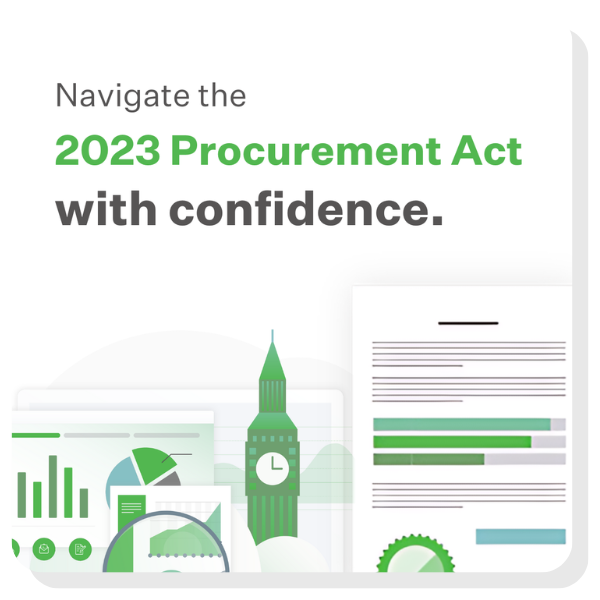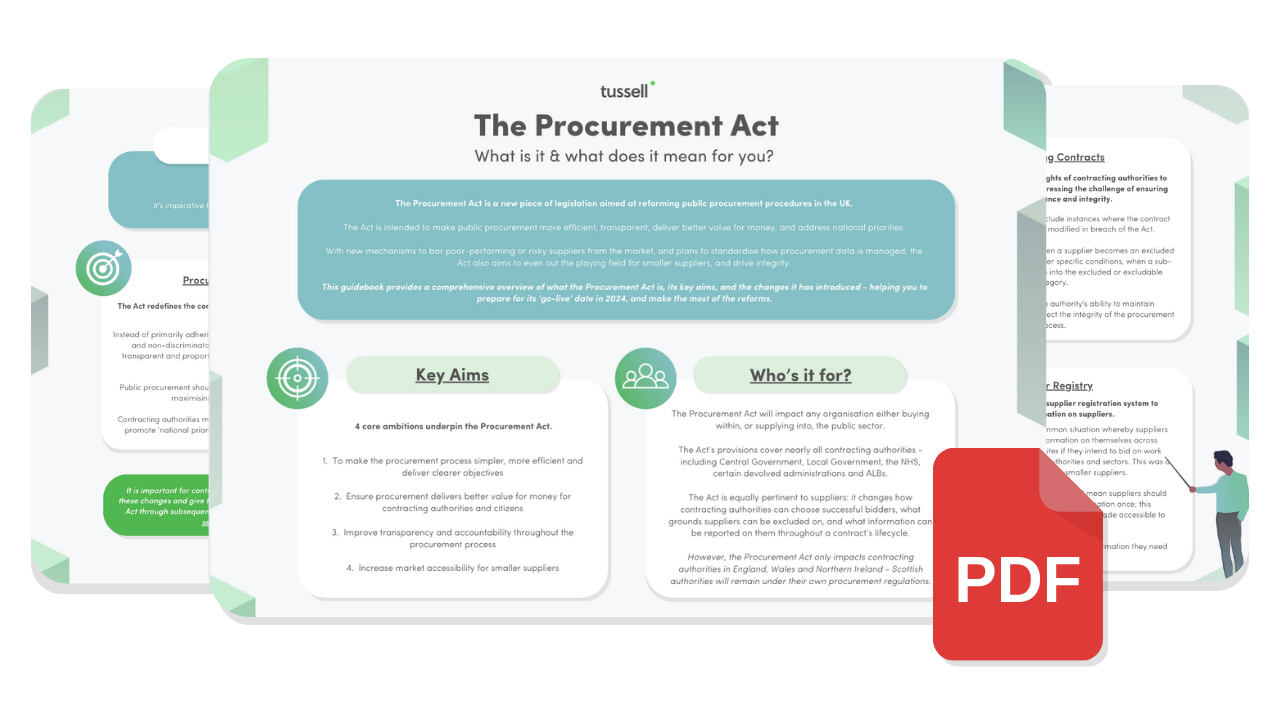The Procurement Act is set to bring in new rules that enforce mandatory KPIs for most public sector contracts valued at over £5m.
The legislation also mandates new Contract Performance Notices to increase transparency and help contracting authorities track the performance of their suppliers.
This article takes a look at how Key Performance Indicators (KPIs) are set to work under the new regime and how suppliers and buyers will be affected.
Skip ahead to read about:
- Where should KPIs be published?
- What happens if KPIs are not attained?
- What does this mean for suppliers?
- Conclusion
***
This article is part of a series of articles on the 2023 Procurement Act.
Head to Tussell's Procurement Act Hub for all the information and resources you need to get Procurement Act ready.
📜 What does the Procurement Act say about KPIs?
Whilst Key Performance Indicators are already commonly used by contracting authorities to keep tabs on contract performance, the Procurement Act (2023) standardises and formalises this approach.
Section 52 of the Act stipulates that:
“…Before entering into a public contract with an estimated value of more than £5 million, a contracting authority must set and publish at least three key performance indicators in respect of that contract.”
However, exceptions to this rule apply in limited incidents, such as when a contracting authority is unable to appropriately assess performance by reference to KPIs.
When deciding on what the KPIs on a given contract should be, buyers should choose the most-important deliverables and devise measurable KPIs that track their performance.
KPIs should be achievable and fair.
To ensure this, contracting authorities ought to consider how the KPIs will be conceived - e.g. will they be negotiated or supplied by suppliers during the bidding process?
Buyers may also choose to have a standard set of KPIs which may be modified on a contract-by-contract basis.
Examples of KPIs may include metrics related to quality of delivery, customer satisfaction, health and safety performance or environmental targets.
Any social value commitments offered by the supplier will also be subject to the new KPI regime.
.png?width=500&height=262&name=Social%20Value%20(1).png)
Read our explainer on social value and the Procurement Act (2023)
❓ Where should KPIs be published?
A contract's KPIs must be laid out in a Contract Details Notice.
This is to be published within 30 days of entering into the contract (or 120 days for a light-touch contract).
In addition to containing the KPIs, a Contract Details Notice should include details of the supplier, the contract duration, and any extension options.
For large contracts valued at over £5m, a copy of the contract must be published alongside the Contract Details Notice (although commercially sensitive information may be withheld).
📍 How should KPIs be tracked?
New Contract Performance Notices (CPNs) have been introduced to promote transparency in relation to contract performance.
For contracts valued at more than £5m, a new Contract Performance Notice should be published at least once every 12 months.
Each notice should include details of the contract, the name of the supplier, and a rating for the performance of that supplier against the KPIs.
The following descriptors should be used to rate performance.
-
Good - Performance is meeting or exceeding the key performance indicators
-
Approaching target - Performance is close to meeting the key performance indicators
-
Requires improvement - Performance is below the key performance indicators
-
Inadequate - Performance is significantly below the key performance indicator
-
Other - Where performance cannot be described as good, approaching target, requires improvement or inadequate (e.g. where no data is available or where relevant service delivery has not taken place)
📉 What happens if KPIs are not attained?
Whilst no formal action is mandated if contract KPIs are not met, the Procurement Act (2023) grants contracting authorities new powers to terminate contracts early if suppliers underperform against the agreed KPIs.
In such instances, a Contract Performance Notice detailing (a) the underperformance, (b) any steps taken by the supplier to attempt to mitigate their failure to perform and (c) why these steps taken were not enough may be published by the contracting authority.
If any damages are awarded to the buyer as a result of contract underperformance of breach of contract, details of this award (or any settlement) must also be published in the CPN.
At this point, contract termination may be pursued.
In some instances, contracting authorities may wish to exclude underperforming suppliers from future procurement processes.
The new rules regarding supplier exclusion and debarment lay out how buyers would go about this process.
🏛️ What does this mean for buyers?
For contracting authorities, the new KPI rules will undoubtedly require significant time investment.
Whether government buyers actually have the personnel and resources required to effectively track KPI performance across all high-value contracts remains to be seen.
Large local governments will regularly have at least 20 £5m+ contracts running at once. That equates to at least 60 individual KPIs that need to be accurately measured and reported on each year.
|
Contracting Authority |
Volume of live £5m+ contracts |
Implied total number of KPIs |
| Essex County Council | 22 | 66 |
| Birmingham City Council | 25 | 75 |
| Cabinet Office | 32 | 96 |
*Data as of August 6th 2024. Source: Tussell
One advantage for buyers relates to the strengthened powers they will have to cancel contracts and exclude suppliers on the basis of poor contract performance.
Some experts hope that this will lead to an overall improvement in contract performance - especially in areas where suppliers regularly underperform.
However, critics of the Procurement Act suggest that the legislation has not gone far enough.
In instances where a supplier regularly scores as 'inadequate' of 'requires improvement' against KPIs but does not meet the threshold for supplier exclusion, contracting authorities have no recourse or right to use this prior performance to discount suppliers from future procurements.
💼 What does this mean for suppliers?
KPIs will make it much easier for fellow suppliers, buyers and the public to hold you accountable for how successfully you're delivering on public contracts.
This has its upsides and potential downsides.
On the one hand, if you successfully perform against a contract's KPIs, you can utilise this as effective accreditation when bidding on future public sector work.
On the other hand, if you fail to meet the contract's KPIs, your business may suffer reputational damage, and find it more difficult to win similar work in the future. Competitors can also attest to these KPIs if said contract goes out to re-tender.
Under the new policy regime, there is a risk for suppliers to government that poor contract performance may lead to both exclusion from future public sector opportunities and public 'naming-and-shaming'.
Thus, some procurement experts have asserted that KPI publishing coupled with new exclusion and debarment powers for contracting authorities may lead suppliers to be more cautious when bidding for contracts.
This is why participation in Preliminary Market Engagement (PME) may become increasingly valuable for suppliers to government as PME events may be used to help define KPIs for upcoming contracts.
🌅 Conclusion
The introduction of mandatory KPIs by the Procurement Act (2023) will undoubtedly have a huge impact on the public procurement landscape.
As of August 6th 2024, over 8,000 live £5m+ contracts would be subject to the new rules, with between 10 and 30 new eligible contracts being awarded every single day. (Source: Tussell)
How effectively contracting authorities are able to track KPI performance remains to be seen.
One thing is for sure: the Procurement Act (2023) is set to be the biggest change to public procurement in a generation.
* * *
If you're worried about how the Procurement Act will affect your business you're not alone.
Tussell provides data-driven insights on the public sector market so that, no matter how the procurement landscape changes, you'll always be ahead on the top frameworks, upcoming opportunities and trends in your market.
Book a demo with the Tussell team to learn how you can start using data to drive sales, future-proof your business and de-risk your public sector strategy.
This article is part of a series of articles on the 2023 Procurement Act.
Head to Tussell's Procurement Act Hub for all the information and resources you need to get Procurement Act ready.
Sources:
Muckle LLP, Reporting on Contract Performance: Procurement Act 2023 (Muckle, https://www.muckle-llp.com/insights/legal-commentary/contract-performance-kpi)
Chic, Guidance: Procurement Act 2023: Performance (Chic, https://www.chicltd.co.uk/news/procurement-act-reforms-performance)
Nick Pimlott, The Procurement Act 2023: Poor contract performance – naming, shaming and exclusion of suppliers (Fieldfisher, https://www.fieldfisher.com/en/insights/the-procurement-act-2023-poor-contract-performance-naming-shaming-and-exclusion-of-suppliers)
Ciaran Brass, The Procurement Act 2023 – Setting and Publishing KPIs (Executive Compass, https://www.executivecompass.co.uk/blog/news/procurement-act-2023-kpis/)
Procurement Act 2023 (Legislation.gov, https://www.legislation.gov.uk/ukpga/2023/54/part/3/chapter/1)












.png?width=815&height=200&name=TUSSELL_Demo_CTA_Banners%20(12).png)
.png?width=815&height=200&name=TUSSELL_Demo_CTA_Banners%20(11).png)
.png?width=815&height=200&name=TUSSELL_Demo_CTA_Banners%20(4).png)

.png?width=815&height=200&name=TUSSELL_Demo_CTA_Banners%20(6).png)
-1.png?width=450&height=330&name=Procurement%20Act%20Hub%20Graphics%20(1)-1.png)


